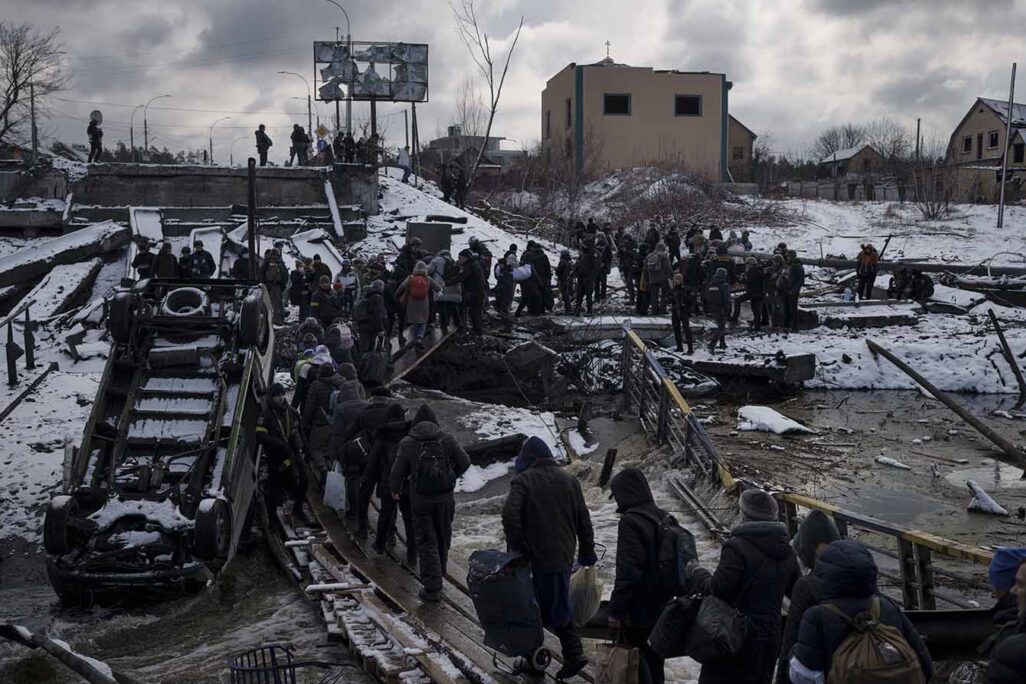
The world was shocked this month by the discovery of mass graves and bound bodies strewn throughout the streets of the Ukrainian cities of Bucha and Irpin in the Kyiv area.
“We’ve been seeing this since March 1,” said Shevchenko. “Cars running over civilians, indiscriminate gunfire, bodies scattered everywhere. Just a few days ago, we finished burying the bodies that were lying here on the side of the main road. I’m convinced that some of the soldiers did this purely for pleasure.”
Maxim Shevchenko: “We don’t have time to deal with the living, much less the dead”
Maxim Shevchenko lives in Kyiv and serves as a volunteer in the nearby city of Irpin and the surrounding area. He has been providing aid, mainly to elderly residents, since the Russians left the city. One day he rescued a man who was more than 90 years old, a veteran of the second world war, who told him a harrowing tale.
“He said that during one of the days of the Russian occupation, he went out of his house and a Russian military truck approached him. A few soldiers came out and began asking for his personal information. He wanted to know why. They didn’t answer. After that, the soldiers asked him to take his clothes off. He refused. They pointed a gun at him, and he understood that they weren’t messing around.
“They took his clothes off and started searching his body for tattoos, probably looking for swastikas. When they didn’t find any they went to the side, discussed among themselves, and came back. They gave him a bottle of water and a military food ration, and with some degree of embarrassment they told him ‘sorry, grandpa.’”
Shevchenko says the story caught his interest.
“Until I met this man, I was sure that the news reports we get here about Russians being brainwashed were exaggerated. After hearing his story, I understood that we actually underestimated their propaganda,” he said.
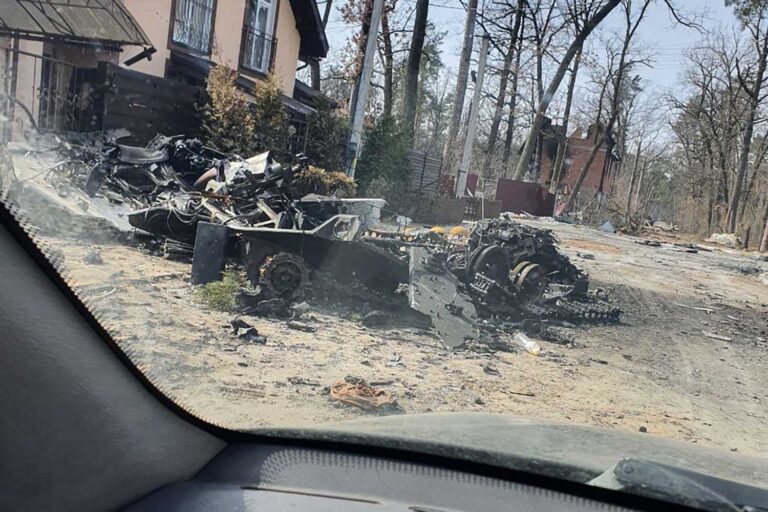
“We have a lot in common with the Russians – language, culture, appearance. And it’s strange how you can stand in front of someone and explain all of your thoughts to him, but then you realize that you come from parallel worlds. They’re completely certain that they came to free us from the Nazis, and I’m sure that after more than a month, once they realized that there aren’t any Nazis here, they started to lose it.”
After the Russians took control of the town of Bucha, the road from Kyiv to Irpin was blocked, and the connection with aid workers in the neighboring city was severed.
“We heard a lot of gunfire from far away,” said Shevchenko. “We realized that they were firing on everyone. We knew it was happening at that very moment, because one of my friends, a volunteer, was there. I was the one who took his body out of the car. I saw it with my own eyes.”
On the other side of the road, next to the car in which his friend was killed, he saw the body of an older man lying on a traffic barrier wearing a jacket of a well-known supermarket chain.
“That’s my grandpa, a security guard at the supermarket, he must’ve gone out to smoke, not bothering anyone, and now his body is riddled with bullet holes. What danger did he pose to the soldiers?”
The volunteers are given difficult tasks. Shevchenko had to tell a family who had called to ask for help locating their parents that they had been killed just outside of their house, and were buried next to it. How did he know? The family’s neighbors told him, after he showed up to their house and found it empty.
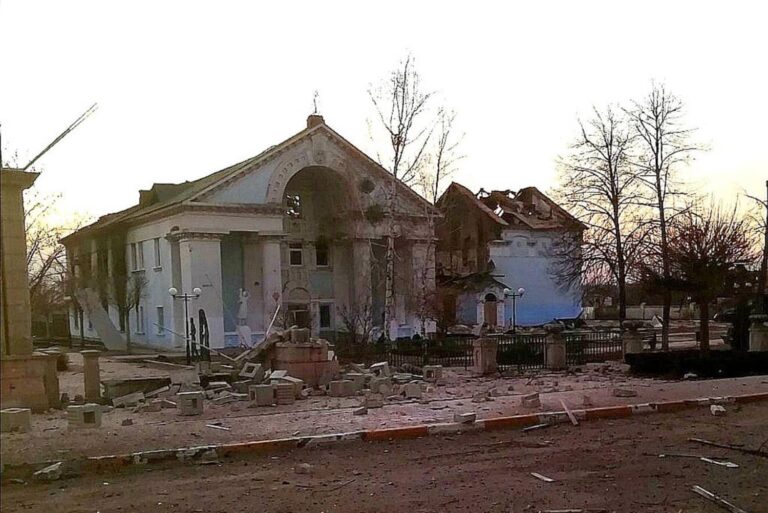
In the final days before the Russian withdrawal, five volunteers from Shevchenko’s unit were killed.
“One of them I knew, Russian soldiers sprayed him with bullets while he was in his car. Our soldiers buried him by the intersection, next to the car. A lot of the burials are done like that, and eventually there will be an exhausting process of locating the bodies and identifying them as people who used to be alive.
“We don’t have time to deal with the living, much less the dead,” says Shevchenko.
“In kindergartens, front yards, parks, on the side of the road; people are buried everywhere. Sometimes multiple people in a single grave. Maybe at first the Russians thought that it was full of Nazis here, maybe some of them don’t think that anymore, but the most recent murders were done simply for pleasure or out of anger.”
Alexander Luzhniak: “The murder of innocent civilians in broad daylight is impossible to comprehend”
“I never would have believed that next to my house, no more than two kilometers away, would be the most famous street of death in the world,” said Alexander Luzhniak, a resident of Irpin. “War happens in Africa, in Gaza, not here.”
A rocket destroyed the roof of his building, along with the entire fifth floor.
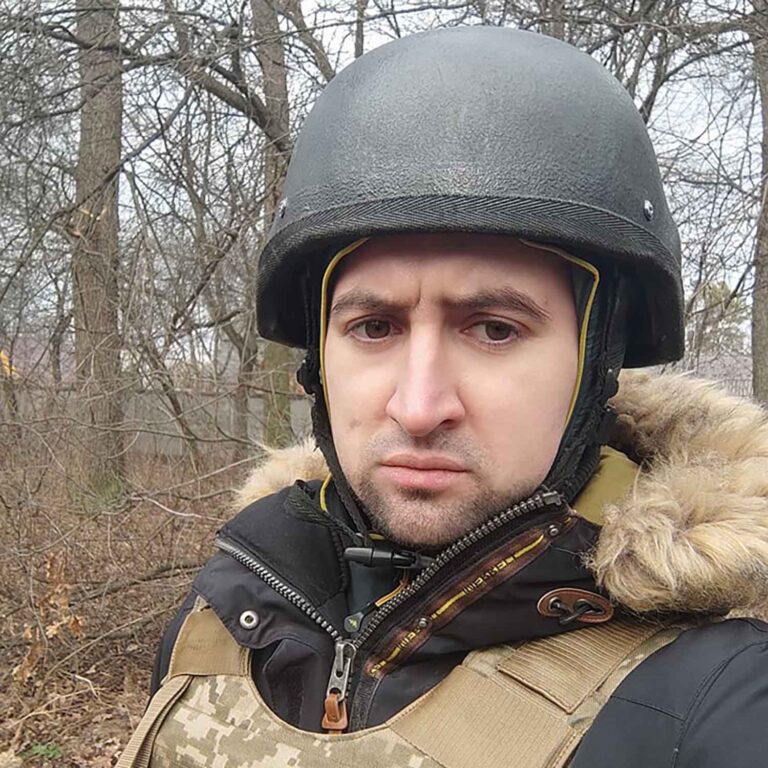
Irpin is a new and growing city, says Luzhniak, full of parks, new shopping centers, and young families coming from Kyiv and throughout the region.
“Even last spring, I had a feeling that this war would happen,” Luzhniak remembered. “I even thought about selling my house.”
He stayed in the city for three weeks to take care of his mother before leaving. As the head of his building’s tenants’ committee, he plans to return to the city soon to assess the damages.
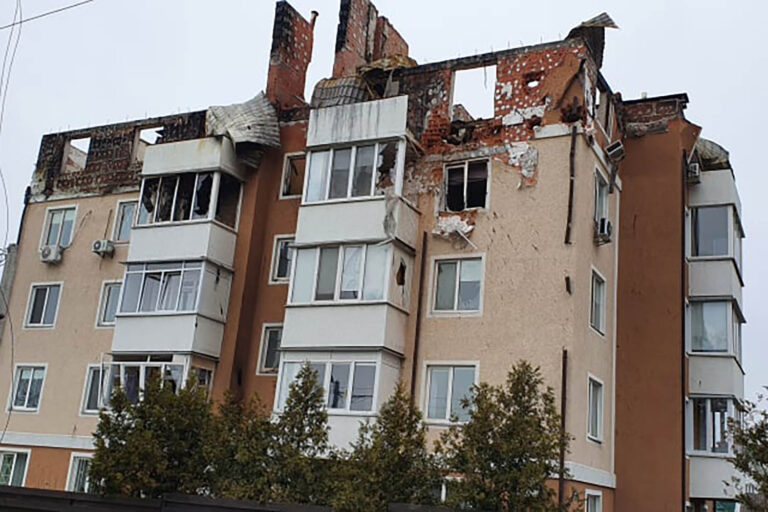
“Many of the residents of Irpin are young families that fled the Donbas region in 2014, now they’ve had to flee their homes again,” Luzhniak explained. “The murder of innocent civilians in broad daylight on the main street of the city, a street that I sometimes ride down on my bicycle, it’s impossible to comprehend.
“When I read that they had laid mines in the foundations of the cookie factory that I really like, and poisoned all of the products, I found myself sitting and saying to myself over and over: ‘what is happening?’”
“Over time the city’s infrastructure will be repaired, step by step, but the people who have been killed can never be brought back. It’s a catastrophe.”
Boris Kramer: “The rumors turned out to be true”
According to Boris Kramer, an academic and Bucha resident, “Bucha is a quieter city for middle-class families who are looking for cheaper apartments as opposed to Kyiv. Bucha is an example of our economic growth that is attracting young people from all over the country.”
For the first two weeks of the Russian invasion, Kramer lived with his partner, Yulia, in the basement of their apartment building. On the first day of the invasion, the couple saw the Russian helicopters landing at the nearby airport in Hustomel, but except for long lines at the bank and at the supermarket, everything, he says, was normal. Then, after a few days, came the deterioration.
“We did not leave the house at all because throughout the day there were either shellings, or shootings, I couldn’t tell exactly,” he said.
“When you go outside you see buildings everywhere on fire. Shattered windows. Clouds of smoke.”
The Kramers lived without any gas or electricity while in the basement. They began storing their water on the day of the invasion in baths and pots. The Kramers are experienced hikers and know how to cook on the go.
“We shared everything with the neighbors all the time. The elderly stayed mostly in the building [and not in the basement with the rest of the tenants],” he explained.
“We didn’t have any cell reception, so we had no idea what was going on. We were pretty much disconnected from the rest of the world. We didn’t see much [happening outside] while we sat in the basement. Once in a while, if there was a break in the shooting, you could look out at the neighbor’s house, or somewhere on the horizon. Neighbors talked about the assaults on civilian but I dismissed them as rumors.”
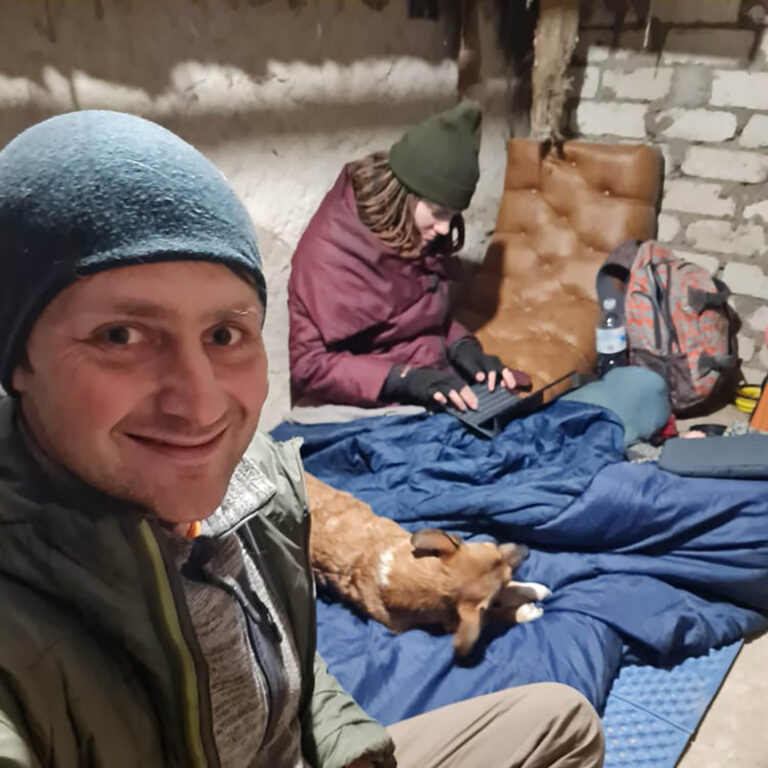
“When we were in Kyiv for the first time, my partner’s father said he saw a body lying in a yard not far from his home," Kramer said. "He said he thought it was a civilian who was out during the curfew. I saw the Russians shooting at civilians, but I did not understand the full scale of their actions. Eventually the rumors turned out to be true.”
At one point, the city was under Russian occupation.
“I did not see any Russians in my neighborhood, but it was clear they were here.”
In the first humanitarian aid corridor, the couple left the city. On the side of the road, he says he saw rows of burnt and perforated cars and the body of a cyclist next to his bike. Three weeks later, this picture was published all over the world.
Do you find it difficult to look at these photos? I know. I also wouldn't want to see it all.
But understand, in these pictures some of us see our friends and family. We see genocide against the Ukrainian people. And the whole world needs to see it.
Do you see this person? He is an ordinary civilian Ukrainian. He was just riding a bicycle in Bucha and was killed by the Russian military. Just in the middle of the street.
This man did not even have time to get off the bike. pic.twitter.com/pLsON6ghT5
— Mary Kravchenko ???????? (@sea_inside3) April 2, 2022
Margarita Sokol: “I know that at least some of the soldiers have a conscience”
On the tenth day of the war, a missile hit a building near Margarita Sokol’s residence in Bucha, and sent her to hide in the kindergarten in the housing center. The garden, with its basements and corridors, can accommodate, at the height of the density, about 300 people. But when it was no longer possible to leave the besieged city, for about two weeks, more than 500 people, almost all the residents, without electricity and gas, were crowded in with very little water.
“The food ran out fast,” Sokol said. “We started calling store owners to try to get food out neatly, mostly bread, fruit, preserves and some milk for the kids. When the bread ran out, we started baking on campfires in the yard, we distributed among all the residents of the housing equally, about 100 grams of bread per day per person.”
Sokol’s husband, like the other apartment owners, stayed to live in their fifth-floor apartment, with their dog. The women in the basement “always sleep with the clothes on, both to be ready and also because it’s very cold.”
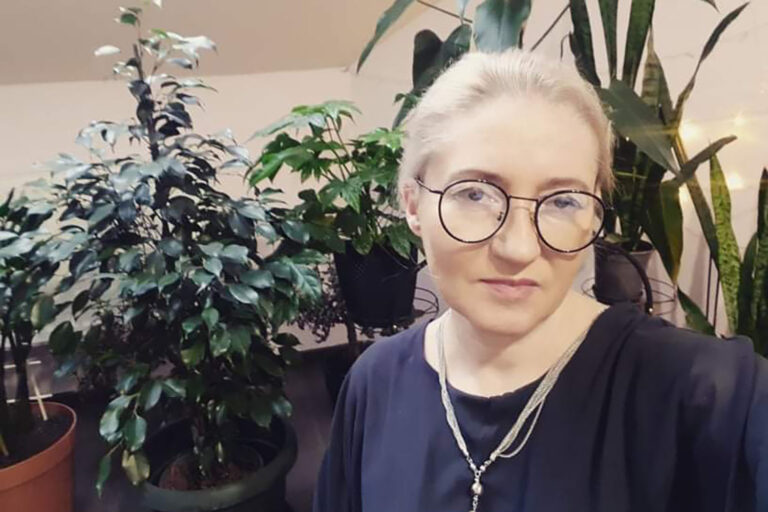
One day a Russian fighter jet flew over the house.
“It looked like he was going to drop a bomb on us,” she said. “The boom was so strong we were sure our roof was flying in the air. I was sure it was the end. I did not stop crying – I could not go home. I am a believing person, I believe that God protects his believers and their homes. But the fear inside me was wild.
“My husband [told me to come up from the basement]. He also tried to bring up the dog, which refused to come up. In our house, only the flowerpot in the kitchen was broken. In the building opposite, a woman got stuck in the basement and managed to extricate herself from the rubble.
"The next day, a minute’s walk from the house, a mother and her two children crossed the road on their way to fetch water, a Russian armor fired at them, only the child remained alive.”
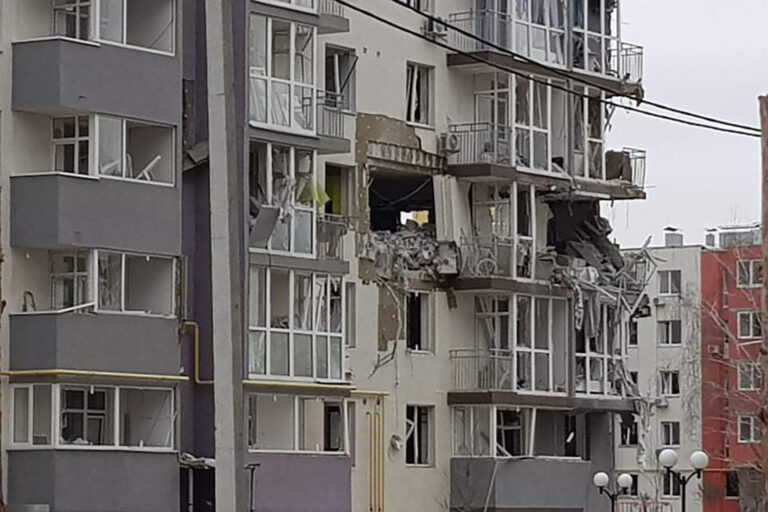
When the humanitarian corridor opened, Sokol was able to escape the city by bus.
“When we went out, I saw the soldiers’ eyes, they understand our pain," she said. "I know that at least some of them have a conscience, that they did not shoot at civilians.”
But families who left town the next day in private cars were less fortunate. The Russians opened fire on a convoy traveling on the Yarfin main road towards Kyiv, killing six women with their children.
Olga Shevchenko: “It’s a matter of luck”
Olga Shevchenko (no relation to Maxim Shevchenko) sat for 16 days nerve-wracking in the basement of her parents’ house in the village of Vorzel, near west of Bucha. She sat and prayed for a miracle.
“Once I realized we were under occupation, I realized no one would come who could help,” she said. “If a shell suddenly falls on the house and it catches fire, or if a Russian force enters and executes us on the spot, no police, fire brigade or ambulance will arrive. We will not be able to call friends or family to say goodbye; no one will speak out and our bodies will continue to lie here for weeks or months.”
Pictures of corpses lying in the doorways of their homes, posted there but not yet reached the West at the time, confirmed her concerns. With the entry of Russian forces into the area, the communication networks were shut down, and the Internet network was silenced. The inhabitants of the occupied villages were cut off from the world. Shevchenko says she left her house only to cook over a fire, after the gas and electricity were cut off.
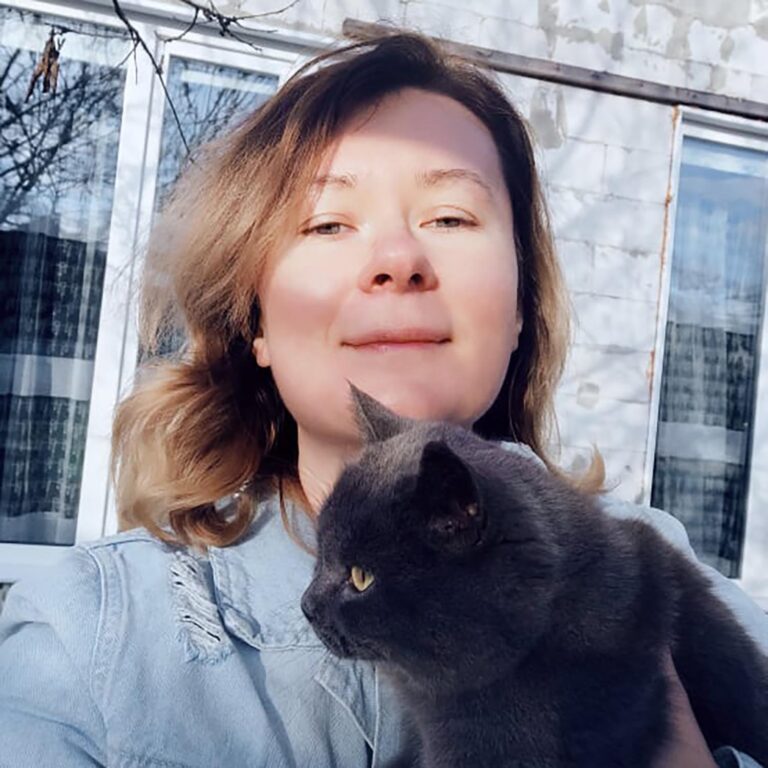
“It was impossible to know what was happening outside the city and they did not know what was happening to us,” she said. “The houses that were next to the main streets were occupied by the Russian soldiers, who settled in the apartments, and the residents continued to live in the basements. There was looting, there was harm to civilians.
“Because we live deep inside the village, and there is a forest between us and the main streets, we were somewhat disconnected from contact with the Russian soldiers.”
Shevchenko told a harrowing story that illustrates the randomness of the violence.
“One time a tank surrounded our house and stopped in front of the door just as my mother came out,” she said. “He stood there for a few seconds and continued driving. My mother remained frozen in place. It’s a matter of luck. There were days when a checkpoint officer could tell a citizen to retrace his steps, and on another day start firing without asking questions.”
Natalia Khodos: “Today I pray twice a day”
Natalia Khodos’ home in Kiev has been turned into a shelter for the residents of Vorzel. On the 17th day of the war, when the humanitarian corridor opened, a young family arrived.
“A young girl asked me bluntly: ‘Where do you run to hide if the air raid sounds?’” Khodos described. “As I was passing out food on the table, everyone, collectively, started crying.”
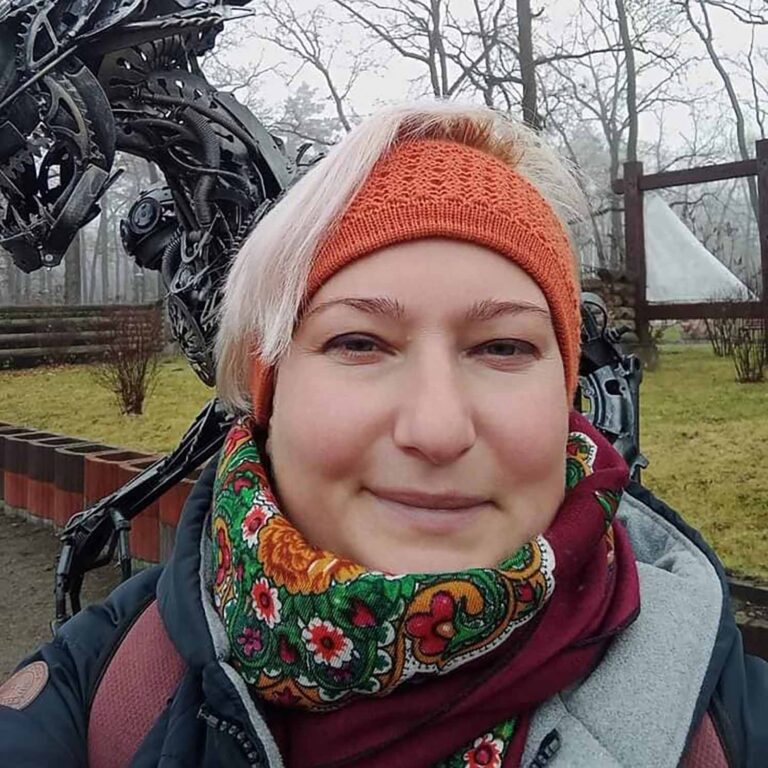
“We are living in the 21st century; Ukraine is one of the largest wheat exporters in the world, and we are, a family hiding in the basement, for two weeks while soldiers shoot young people in their apartments and offices. And for what? For a laptop and an iPhone?” she asked.
“Every time you go out to pray, that’s all you have. I’m not a very religious person myself, but today I pray twice a day.”
Pets Also in Need of Rescue
Not only humans suffer. Shevchenko says, on the phone from Kyiv, that one day he went up to a high-rise building in Irpin to rescue a disabled elderly man. In the stairwell he heard howls and barks.
“I think I was the first person to walk the building in a long time. These are animals left behind, thinking their owners would be returning in a few days, but most of them starved to death, after more than a month of loneliness.”
Many dogs roam the city streets, he says, apparently escaping from private homes. Some feed on human corpses. A volunteer told him he saw a dog running with a human hand in its mouth. Some of the dogs are injured, some are shot, dismembered, charred.
“It’s weirder than a war movie, but it’s the reality,” he said.
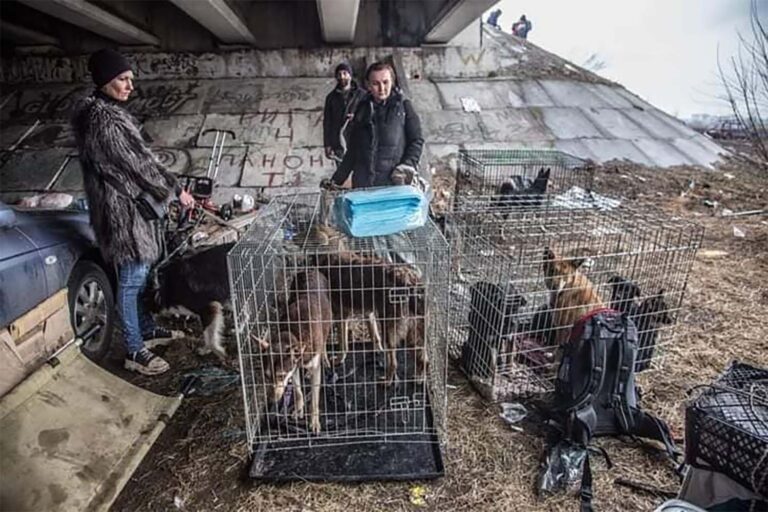
There are animal rescue units in the city, buckling under the load.
“The amount of demand for animal rescue is overflowing,” Khodos wrote to Ladnava, a volunteer with one of the rescue units. “In cases where it is impossible to rescue, the owners at least want to feed them, and in any case it is very difficult to give an answer.”
People in these units, all volunteers, demand that animal food and veterinary help, enter the humanitarian quotas, as well as the possibility of removing animals in an orderly manner.
“To rescue some of the dogs and cats, the volunteers risked their own lives," she explained. "The information we receive is scarce, the authorities do not come to our aid, and we are afraid that orders will be given to shoot the animals. And even if they do not, they will either starve or die.”
This article was translated from Hebrew by Sam Edelman and Zak Newbart.






